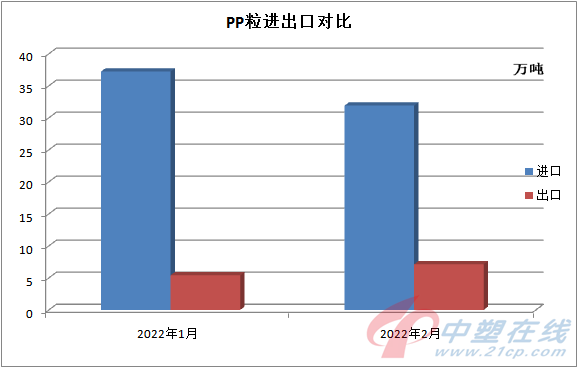Stock Name: Xinzhongde Stock Code: 430683
PP: The situation is severe and complex—external demand is strong, while domestic demand remains weak.
发布时间:2022-03-29
In February, with numerous uncertainties and instabilities weighing heavily on the market, the foreign trade landscape remained challenging and complex, as polypropylene (PP) pellet imports declined while exports surged. According to the latest customs data, imports for the month totaled approximately 319,100 tons, down 5.31% from the previous month but up 10.95% year-on-year. Meanwhile, exports reached around 71,200 tons, marking a significant monthly increase of 31.25% and a robust annual rise of 57.21%.

I. On the Import Side
In early February, imports of PP in primary forms totaled approximately 197,500 tons, down 15.93% from the previous month but up 4.14% year-on-year. Imports of ethylene-propylene polymers reached around 108,300 tons, declining by 15.93% month-on-month while increasing by 21.66% compared to the same period last year. Meanwhile, imports of other primary-form propylene copolymers stood at roughly 13,300 tons, falling 32.53% from the prior month but rising slightly by 3.31% year-on-year. Domestically, the ongoing COVID-19 situation continues to see sporadic, localized outbreaks, and the slowdown in domestic demand remains the primary factor influencing these trends. According to data from the National Bureau of Statistics, China’s PMI import index has now remained below the boom-or-bust threshold for nine consecutive months.

In February, the main countries supplying PP granules remained largely unchanged compared to January. South Korea continued to lead with 89,500 tons, maintaining a significant share of 28.04%, though its imports still declined by about 17.81% from January levels. The United Arab Emirates and Singapore followed closely behind, accounting for 14.1% and 13.13% of imports, respectively.
PP, 10,000 tons, decreased, grew by approximately, import volume, year-on-year, imports, February

